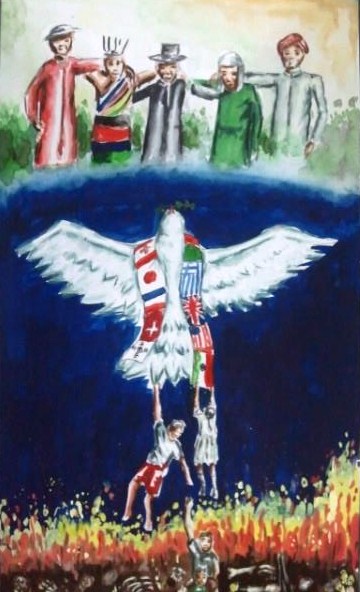By Ananya S Guha
Everytime I think of Manipur I think of a land desecrated by violence over the last three decades, but also a land which can in very good measure boast with head held high of its talent in sports, literature and the performing arts. And whenever I go to Imphal mainly for official work, the fort of Kangla speaks of an ancient kingdom, history and people. History is truth; we cannot quarrel with it, the more we do so with our interventionist prattle, the more does history reinstate itself with authority. And whenever I look at this fort with its emblematic images, the more I am reminded of a past, of an ancient civilization, perhaps a happy people rich with legends and mythologies. The present is a shattering, nerveracking break down, a story of utter lies. This disconnect is terrible, it is a monstrosity. I almost break down in the recesses of the inner self, when people and supremos speak of the valley / hill ‘divide’ or dichotomy.

The sweeping roads, the steady flow of traffic has undoubtedly an underlying unease and disquiet. Yet, I always wonder as to when things will revert to equanimity, a poise which bespeaks of a thousand vicissitudes of a rich culture.
And, when I read the poems of say, Thangjam Ibopishak or my friend Robin Ngangom, I can feel a brutalisation, a deep down hurt welling into tears of anomynity, unseen. There is power in their poems, yet deep down there is a feverish search for peace. There is irony in the poems, yet there is love. There is politics in the poems, but there is love. There is love in the poems, yet there are empty spaces of vacuity.
Near market areas or on the main road by the hotel in which I am staying early morning erupts, conflagrates into activity. Yet by the time sun sets this hustle becomes inert and that unease, the disquiet, even the fear comes back. I know why perhaps a vivacious, resilient people are almost benumbed into life’s torpor.
A couple of years back through my work I was associated with an NGO for conducting some vocational training on making handicrafts from the famed Kouna and Chumthang reeds. The participants were young women. The adroitness with which they made the beautiful baskets, or show pieces stunned me into quietude. I simply watched, but noticed a sadness in their eyes – a plaintive call to my heart. In the midst of all the upheavals this state was witness to and was experiencing the Kasturba Gandhi Institute led by Sareeta Devi was quietly engaging itself with the task of imparting vocational training to women. I came back determined to be doubly associated with this tenacious organization.
And, it is the tenacity which makes this land one of the foremost in the field of sports, literature or theatre. The ancient virtues of a kingdom cannot simply be lost. It glorifies itself in the bewildering presence, the landscape of ghosts. The ancient kingdom is not a relic of the past. It seeps itself in the present. The temple of virtue rests on an edifice of violence and unease. But relive the past, we must, then only; the anarchy becomes a myth, a sheer travesty of truth.



